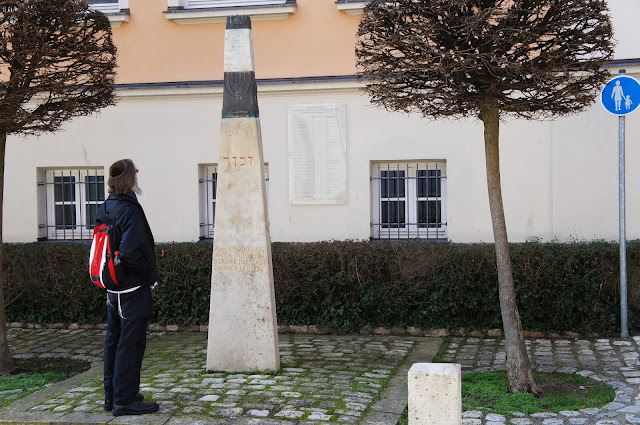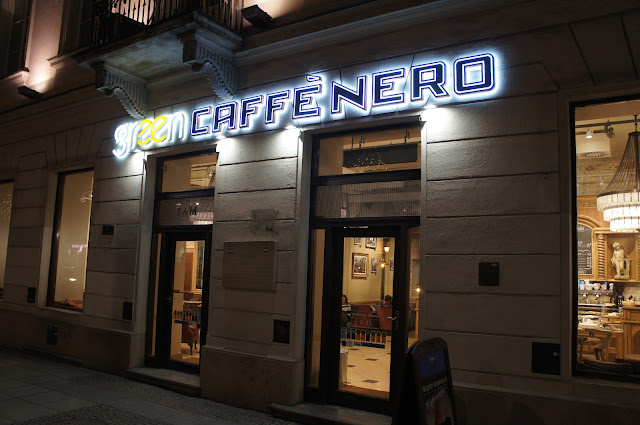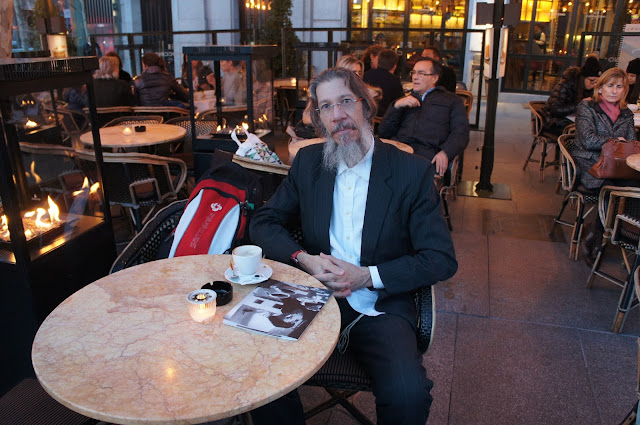 |
| MEMORIAL TO THE OLD SYNAGOGUE. |
Sunday, Adar 17, 5778. March 4, 2018.
Shalom! World.
Nördlingen, city in Bavaria, Germany.
 |
| JUDENGASSE |
 |
| JUDENGASSE |
Jews were to be found in Nördlingen from the 12th century, but the sources reflect an organized community only in the 13th century. Eight Jews were martyred there during the Rindfleisch persecutions (1298), but community life was renewed soon afterward. In 1331 Emperor Louis IV granted four "honorable" Jewish elders the extraordinary privilege of jurisdiction over foreign Jews. There were about 20 houses in the Judengasse (which was also inhabited by christians), and the community possessed a Synagogue and a cemetery; the Jews made their living as moneylenders. During the Black Death persecutions of 1348 c.e. many Jews were killed or imprisioned; their property and promissory notes were confiscated by the city. Emperor Charles IV pardoned the burghers and canceled their debts to the Jews. Subsequentely he acced to the city's request to readmit Jews.
 |
| JUDENGASSE |
A Synagogue was mentioned in 1357, and in 1378 the community consecrated a cemetery. However, during fresh riots in 1384 about 200 Jews were murdered and the community ceased to exist. After Jews were again admitted into the city in 1401, a new and prosperous community came into use in 1415. Taxes were heavy: five
Schutzjuden ("protected Jews") provide three-eighths of the amount paid by the whole 34-members city council.
In 1437 Jews were forbidden to hire christians servants and ordered to wear the Jewish badge-though this order does not seem to have been strictly enforced. The Hussite wars resulted in temporary banishment between 1454 and 1459, and hostile agitation by the clergy led to the expulsion of the Jews in 1507.
 |
| Stolpersteine |

In the edict of expulsion of 1506, which was confirmed by the emperor as the overlord of the Jews, it was expressly stupulated that no lord should allow the Jews to settle on his estates within 2 (= 10 English) miles from the city; but the counts of Öttingen and the Teutonic knights who owned estates near the city nevertheless received Jews there, without heeding either the city's protest or the imperial edicts. The city thereupon prohibited its citizens from dealing with Jews (1509); but neither this edict, frequently repeated, nor the combined efforts at the Reichstag (1530) of all the free cities to prohibit or to restrict money-lending by Jews were effective. The Synagogue was sold in 1517, but refuggees who had settled nearby attended Nördlingen's annual fairs.


A regulation issued Feb. 18, 1669, which precribed that all business connected with loans should be transacted in the city hall, where the cash was to be paid, the trasactions recorded, and the pledges kept, and that the rate of interest should not exceed 8 per cent for loans above 25 florins and 10 per cent for smaller sums, was frequently renewed (1682, 1706, 1712, 1732). It had, however, hardly more pratical effect than the frequent prohibitions of peddling or of dealing in certain articles (1712, 1721, 1725, 1729, and 1732). While visiting the fairs could not be prohibited, as this right of the Jews rested on a general law for the whole empire, the city of Nördlingen placed various obstacles in the way of the Jews, as, for instance, the prohibition against selling in a booth. An exception was made in favor of the imperial body-physician Löw, who waspermitted to sell his remedies (1664), and of a Dutch jeweler (1786).

As a matter of course, Jews visiting the city during the fairs, or on business even for a day only, as well as those who were permitted to reside there temporarily in times of war, had to pay a poll-tax. A community, with 25 families, was organized in 1870, dedicated a new Synagogue in 1885, and founded a
hevra kaddisha in 1898. It numbered 489 persons in 1899, and 314 (3,8% of the total) in 1913.
 |
| JEWS WERE DEPORTED TO KONZENTRATIONSLAGER DURING WWII |
In 1900 the Jews of Nördlingen numbered 408 in a total population of 8.299. By June 16, 1933, only 186 remained; 145 of them left before 1942, when the remnantes of the Jewish were deported. The mayor of the city prevented the destruction of the Synagogue in 1938, and in 1952 it was sold to a Protestant group as community center. The building was rebuilt but, in the process, the architecture of the former Synagogue was destroyed. In 1997 the building was demolished and replaced by a new structure. A plaque commemorates the former Synagogue.

Shalom! Aleichem.
Cultural Support: Jacob Jr B.A.C.E., avec L'Integration d'Association avec Israel et dans le Monde/Cz.




 In the edict of expulsion of 1506, which was confirmed by the emperor as the overlord of the Jews, it was expressly stupulated that no lord should allow the Jews to settle on his estates within 2 (= 10 English) miles from the city; but the counts of Öttingen and the Teutonic knights who owned estates near the city nevertheless received Jews there, without heeding either the city's protest or the imperial edicts. The city thereupon prohibited its citizens from dealing with Jews (1509); but neither this edict, frequently repeated, nor the combined efforts at the Reichstag (1530) of all the free cities to prohibit or to restrict money-lending by Jews were effective. The Synagogue was sold in 1517, but refuggees who had settled nearby attended Nördlingen's annual fairs.
In the edict of expulsion of 1506, which was confirmed by the emperor as the overlord of the Jews, it was expressly stupulated that no lord should allow the Jews to settle on his estates within 2 (= 10 English) miles from the city; but the counts of Öttingen and the Teutonic knights who owned estates near the city nevertheless received Jews there, without heeding either the city's protest or the imperial edicts. The city thereupon prohibited its citizens from dealing with Jews (1509); but neither this edict, frequently repeated, nor the combined efforts at the Reichstag (1530) of all the free cities to prohibit or to restrict money-lending by Jews were effective. The Synagogue was sold in 1517, but refuggees who had settled nearby attended Nördlingen's annual fairs.
 A regulation issued Feb. 18, 1669, which precribed that all business connected with loans should be transacted in the city hall, where the cash was to be paid, the trasactions recorded, and the pledges kept, and that the rate of interest should not exceed 8 per cent for loans above 25 florins and 10 per cent for smaller sums, was frequently renewed (1682, 1706, 1712, 1732). It had, however, hardly more pratical effect than the frequent prohibitions of peddling or of dealing in certain articles (1712, 1721, 1725, 1729, and 1732). While visiting the fairs could not be prohibited, as this right of the Jews rested on a general law for the whole empire, the city of Nördlingen placed various obstacles in the way of the Jews, as, for instance, the prohibition against selling in a booth. An exception was made in favor of the imperial body-physician Löw, who waspermitted to sell his remedies (1664), and of a Dutch jeweler (1786).
A regulation issued Feb. 18, 1669, which precribed that all business connected with loans should be transacted in the city hall, where the cash was to be paid, the trasactions recorded, and the pledges kept, and that the rate of interest should not exceed 8 per cent for loans above 25 florins and 10 per cent for smaller sums, was frequently renewed (1682, 1706, 1712, 1732). It had, however, hardly more pratical effect than the frequent prohibitions of peddling or of dealing in certain articles (1712, 1721, 1725, 1729, and 1732). While visiting the fairs could not be prohibited, as this right of the Jews rested on a general law for the whole empire, the city of Nördlingen placed various obstacles in the way of the Jews, as, for instance, the prohibition against selling in a booth. An exception was made in favor of the imperial body-physician Löw, who waspermitted to sell his remedies (1664), and of a Dutch jeweler (1786). As a matter of course, Jews visiting the city during the fairs, or on business even for a day only, as well as those who were permitted to reside there temporarily in times of war, had to pay a poll-tax. A community, with 25 families, was organized in 1870, dedicated a new Synagogue in 1885, and founded a hevra kaddisha in 1898. It numbered 489 persons in 1899, and 314 (3,8% of the total) in 1913.
As a matter of course, Jews visiting the city during the fairs, or on business even for a day only, as well as those who were permitted to reside there temporarily in times of war, had to pay a poll-tax. A community, with 25 families, was organized in 1870, dedicated a new Synagogue in 1885, and founded a hevra kaddisha in 1898. It numbered 489 persons in 1899, and 314 (3,8% of the total) in 1913.






Comments
Post a Comment